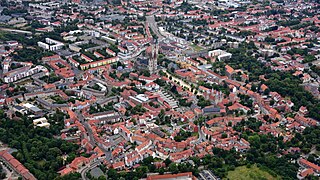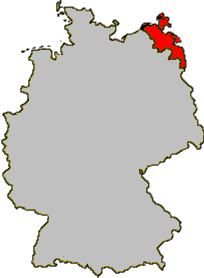External links
- https://web.archive.org/web/20070304090926/http://www.ekmd-online.de/portal/
- http://www.ekd.de (Protestant Church in Germany)
The Evangelical Church of the Church Province of Saxony (Evangelische Kirche der Kirchenprovinz Sachsen; KPS) was the most important Protestant denomination in the German state of Saxony-Anhalt. As a united Protestant church, it combined both Lutheran and Reformed traditions (Prussian Union). On 1 January 2009 the church body merged with the Evangelical Lutheran Church in Thuringia into the Evangelical Church in Central Germany.
The Evangelical Church of the Church Province of Saxony emerged on 1 October 1950, when the ecclesiastical province of Saxony within the Evangelical Church of the old-Prussian Union assumed its independence as church body of its own. The history of the old-Prussian Union is tied with the history of the kingdom of Prussia.
Following the second constitution of the German Democratic Republic (GDR), enacted on 9 April 1968 and accounting for its de facto transformation into a communist dictatorship, the church bodies were deprived their status as statutory bodies (German: Körperschaft des öffentlichen Rechts) and the church tax, automatically collecting parishioners' contributions as a surcharge on the income tax, was abolished. Now parishioners had to fix the level of their contributions and to transfer them again and again on their own. This together with ongoing discrimination of church members, which let many secede from the church, effectively eroded the adherence of parishioners and the financial situation of the Evangelical Church.
The Evangelical Church of the Church Province of Saxony was a full member of the Protestant Church in Germany (Evangelische Kirche in Deutschland, EKD). The leader of the church was bishop Axel Noack (2006). The church had approx. 504,200 members (in December 2005) in 2,020 church parishes.
The seat of the bishop was Magdeburg Cathedral. There are several former cathedrals in the territory retaining their original name, notably the Halberstadt Cathedral, the Merseburg Cathedral, the Naumburg Cathedral and Zeitz Cathedral. There are also some other imposing churches (often former collegiate churches) called "Dom" (often translated as cathedral) in the area.
The Evangelical Church of the Church Province of Saxony was a member of the Union of Evangelical Churches in Germany and the Community of Protestant Churches in Europe. In Wittenberg the church had its own academy.
The Ordination of women and the blessing of same-sex unions has been allowed.
Since 1 July 2004 the church was on the way to merge with the Evangelical Lutheran Church in Thuringia into the Evangelical Church in Central Germany, with effect of 1 January 2009.
The area covered by the Evangelical Church of the Church Province of Saxony was equivalent to the old Prussian Saxony province, similar to the East German state of Saxony-Anhalt (1946–1952; except of former Anhalt) and small parts of the states of Brandenburg and Thuringia.
The chief executive body was the consistory in Magdeburg, however, there were three more consistories with regional competence in Roßla (for the Lutheran church of the mediatised County of Stolberg-Rossla; 1719–1947 then merged with the following), in Stolberg at the Harz (for the Lutheran church of the mediatised County of Stolberg-Stolberg; 1553–2005, then merged into the consistory in Magdeburg) and in Wernigerode (for the Lutheran church of the mediatised County of Stolberg-Wernigerode; 1658–1930, then merged into the consistory in Magdeburg). A consistorial president chaired the consistory as an executive, as to the spiritual leadership there was one general superintendent, supported by a second and a third general superintendent (as of 1867 and 1911, respectively). Some holders of the general superintendency were royally styled as bishop, then still considered a rather non-Protestant title. In 1933 Nazi-submissive German Christians, then dominating the legislative general and provincial synods, introduced the title bishop for the spiritual leaders, including their hierarchical supremacy over other church collaborators. The title was retained also after the end of the Nazi dictatorship, however, without any hierarchical supremacy.
General superintendents, 1st office (1867–1933)
| General superintendents, 2nd office (1867–1933)
| General superintendents, 3rd office (1912–1933)
|
The election of the synod was for six years. The synod met each year for one meeting. The elected leader of the "provincial synod" was called Präses (preases).
Praesides (since 1946):

Saxony-Anhalt is a state of Germany, bordering the states of Brandenburg, Saxony, Thuringia and Lower Saxony. It covers an area of 20,451.7 square kilometres (7,896.4 sq mi) and has a population of 2.17 million inhabitants, making it the 8th-largest state in Germany by area and the 11th-largest by population. Its capital is Magdeburg and its largest city is Halle (Saale).

The Protestant Church in Germany, formerly known in English as the Evangelical Church in Germany, is a federation of twenty Lutheran, Reformed, and United Protestant regional Churches in Germany, collectively encompassing the vast majority of the country's Protestants. In 2020, the EKD had a membership of 20,236,000 members, or 24.3% of the German population. It constitutes one of the largest Protestant bodies in the world. Church offices managing the federation are located in Herrenhausen, Hanover, Lower Saxony. Many of its members consider themselves Lutherans.
The Evangelical Lutheran Church in Thuringia was a Lutheran member church of the umbrella Protestant Church in Germany. The seat of the church was in Eisenach. The church covered those parts of the state of Thuringia that were not part of the former Province of Saxony. It was the largest Protestant denomination in this area.

The Archbishopric of Magdeburg was a Latin Catholic archdiocese (969–1552) and Prince-Archbishopric (1180–1680) of the Holy Roman Empire centered on the city of Magdeburg on the Elbe River.

The Province of Saxony, also known as Prussian Saxony, was a province of the Kingdom of Prussia and later the Free State of Prussia from 1816 until 1944. Its capital was Magdeburg.

Halberstadt is a town in the German state of Saxony-Anhalt, the capital of Harz district. Located north of the Harz mountain range, it is known for its old town center, which was largely destroyed by Allied bombings in the late stages of World War II after local Nazi leaders refused to surrender. The town was rebuilt in the following decades.

The Pomeranian Evangelical Church was a Protestant regional church in the German state of Mecklenburg-Vorpommern, serving the citizens living in Hither Pomerania. The Pomeranian Evangelical Church was based on the teachings brought forward by Martin Luther and other Reformators during the Reformation. It combined Lutheran and Reformed traditions. The seat of the church was Greifswald, the bishop's preaching venue was the former Collegiate Church of St. Nicholas in Greifswald.
The County of Stolberg-Rossla was a county of the Holy Roman Empire. Its capital was Rossla, now in Saxony-Anhalt, Germany. It was owned and ruled by a branch of the House of Stolberg from 1341 until 1803.

The Independent Evangelical-Lutheran Church is a confessional Lutheran church body of Germany. It is a member of the European Lutheran Conference and of the International Lutheran Council (ILC). The SELK has about 33,000 members in 174 congregations. The seat of SELK is in Hanover.

The Diocese of Magdeburg is a Latin Church diocese of the Catholic Church, located in the German state of Saxony-Anhalt. Its seat is Magdeburg; it is suffragan to the Archdiocese of Paderborn.

The Prussian Union of Churches was a major Protestant church body which emerged in 1817 from a series of decrees by Frederick William III of Prussia that united both Lutheran and Reformed denominations in Prussia. Although not the first of its kind, the Prussian Union was the first to occur in a major German state.

Ilsenburg Abbey was a monastery of the Benedictine Order located at Ilsenburg near Wernigerode, in Saxony-Anhalt in Germany. The former abbey is a stop on the Romanesque Road.

is a town and a former municipality in the district of Mansfeld-Südharz, in the German State of Saxony-Anhalt, Germany. It is situated in the southern part of the Harz mountains, about 27 kilometres (17 mi) west of Sangerhausen, and 13 km (8.1 mi) northeast of Nordhausen. Since 1 September 2010, it has been part of the municipality of Südharz.

The Evangelical-Lutheran Church of Hanover is a Lutheran church body (Landeskirche) in the northern German state of Lower Saxony and the city of Bremerhaven covering the territory of the former Kingdom of Hanover.
The Evangelical Church Berlin-Brandenburg-Silesian Upper Lusatia is a United Protestant church body in the German states of Brandenburg, Berlin and a part of Saxony.

The Evangelical Lutheran Church in Brunswick is a Lutheran church in the German states of Lower Saxony and Saxony-Anhalt.

The Evangelical Church in Central Germany is a United church body covering most of the German states of Saxony-Anhalt and Thuringia and some adjacent areas in Brandenburg and Saxony.

The Protestant Church of Anhalt is a United Protestant member church of the Protestant Church in Germany. Its seat is in Dessau-Roßlau in Saxony-Anhalt, in the former duchy of Anhalt. This church is the smallest regional church in Germany in terms of membership.
The German Protestant Church Confederation was a formal federation of 28 regional Protestant churches (Landeskirchen) of Lutheran, Reformed or United Protestant administration or confession. It existed during the Weimar Republic from 1922 until replaced by the German Evangelical Church in 1933. It was a predecessor body to the Protestant Church in Germany.

In Protestant usage, a consistory designates certain ruling bodies in various churches. The meaning and the scope of functions varies strongly, also along the separating lines of the Protestant denominations and church bodies.